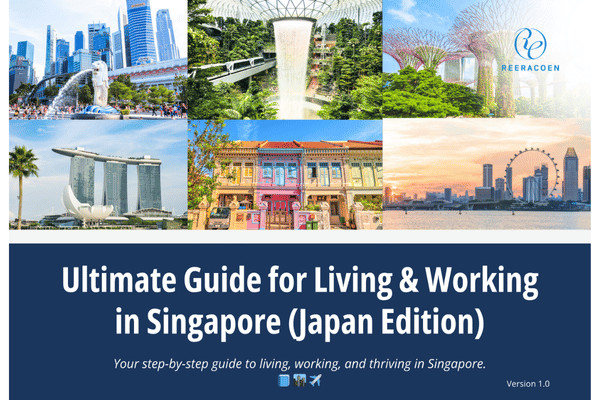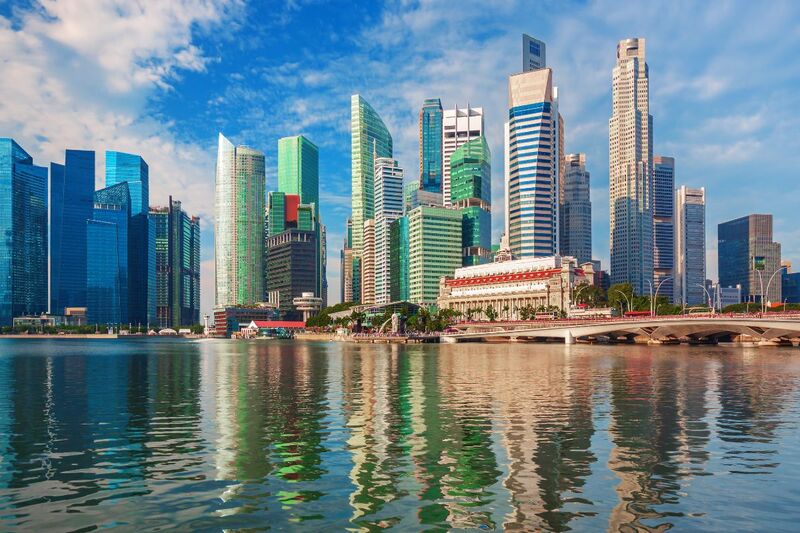Moving to Singapore? The Ultimate, Data-Backed Guide (Japan Edition)

Relocating to Singapore is a big step — one that opens doors to global careers, excellent schooling, and a vibrant cultural experience. This guide focuses on professionals and families relocating from Japan, one of the largest expat communities in Singapore.
It is also part of Reeracoen’s Expat Living Series, where we share resources tailored for different international professionals and companies across Asia-Pacific. While this article focuses on professionals relocating from Japan, its guidance is relevant to any international talent moving to Singapore.
Your First 30 Days: A Smart Sequence That Works
Week 1–2: Legal & admin essentials
- Finalise your work or dependant pass.
- Register for Singpass, Singapore’s secure digital identity.
- Open a bank account and enable PayNow (90%+ corporate adoption rate).
- Get a SIM card and home broadband plan.
Week 2–3: Mobility & housing prep
- Pick up a SimplyGo or EZ-Link card for MRT and bus travel.
- Shortlist neighbourhoods based on MRT line and commute.
- Visit hawker centres and supermarkets near your potential home.
Week 3–4: Health, schools, and community
- Secure medical insurance (essential for foreigners).
- Tour schools (Japanese and international).
- Join community groups such as JAS (Japanese Association Singapore).
Housing: Location and Transit Matter
Singapore’s MRT network spans 240 km with over 140 stations, and the government plans to put 80% of households within a 10-minute walk of a station by the early 2030s. Reliability targets are among the world’s highest, at 1 million train-km between delays.
Key neighbourhoods:
East Coast: Family-friendly, cycling paths, seaside lifestyle.
Orchard & River Valley: Central, walkable, convenient for singles.
Queenstown/Buona Vista: Schools and tech/science parks.
Tanjong Pagar: Close to the CBD, packed with dining options.
💡 Tip: Trial your commute during peak hours before signing a lease.
Everyday Life: Cash-Light, Community-Rich
Over 90% of daily transactions in Singapore are digital.
- Payments: Singapore is nearly cashless — 94% of SMEs use at least one digital tool — yet cash is still widely accepted. PayNow is essential for quick transfers.
- Groceries: Local chains like NTUC FairPrice and Cold Storage, plus Japanese comfort options such as Don Don Donki and Meidi-ya.
- Food: Explore hawker centres — Maxwell, Lau Pa Sat, Amoy — where meals average SGD $4–6.
- Healthcare: Singapore General Hospital and NUH are world-class, but foreign residents are required to maintain valid insurance coverage. Many clinics provide Japanese-speaking support.
- Climate: Tropical, humid, and air-conditioned offices often set between 18–21°C — pack light layers.
Community and Schooling
Singapore is home to 32,000+ Japanese residents, supported by schools, associations, and cultural networks. The Japanese School Singapore is one of the largest outside Japan, complemented by Waseda Shibuya and leading international schools like UWCSEA and Dulwich.
Join established community networks such as the Japanese Association Singapore (JAS), JCCI, and informal groups on Facebook and LINE. Festivals such as National Day, Hari Raya, and Deepavali are celebrated citywide, giving expats cultural immersion opportunities.
FAQs
Q1. Is Singapore family-friendly for expats from Japan?
Yes. It is one of Asia’s safest cities with excellent schools, healthcare, and a strong support network.
Q2. How important is living near an MRT station?
Very. Singapore is transit-first, and MRT adjacency saves time and money.
Q3. Is Singapore fully cashless?
Not yet. PayNow and QR payments dominate, but cash is still accepted almost everywhere.
Q4. What are must-know rules?
No eating or drinking on trains, smoke only in designated areas, no chewing gum imports, and fines for littering or jaywalking.
Ready to Make Singapore Home?
📖 Download the Ultimate Guide for Living & Working in Singapore (Japan Edition):
Step-by-step advice on housing, transport, healthcare, and more. [Download the Guide]
✅ Final Author Credit
By Valerie Ong (Regional Marketing Manager)
Published by Reeracoen Singapore — a leading recruitment agency in APAC.
Need personalised support?
For Candidates (relocating to Singapore, including from Japan): Start your move with a bilingual consultant. [Book a free relocation & career consult]
For Employers (supporting staff relocating internationally): Get an onboarding plan that works. [Talk to our Japan Desk]
References
- Land Transport Authority (LTA) – Rail Network & Reliability
- Ministry of Manpower (MOM) – Foreign Workforce Numbers
- Mercer – Cost of Living City Ranking
- Infocomm Media Development Authority (IMDA) – Singapore Digital Economy Report
- Japanese Association Singapore (JAS) – Community Information

Disclaimer:
The information provided in our blog articles is intended for general informational purposes only. It is not a substitute for professional advice and should not be relied upon as such.
While we strive to provide accurate and up-to-date information, the ever-evolving nature of certain topics may result in content becoming outdated or inaccurate over time. Therefore, we recommend consulting with qualified professionals or experts in the respective fields for specific advice or guidance. Any actions taken based on the information contained in our blog articles are solely at the reader's discretion and risk. We do not assume any responsibility or liability for any loss, damage, or adverse consequences incurred as a result of such actions.
We may occasionally provide links to external websites or resources for further information or reference. These links are provided for convenience and do not imply endorsement or responsibility for the content or accuracy of these external sources. Our blog articles may also include personal opinions, views, or interpretations of the authors, which do not necessarily reflect the views of our organisation as a whole. We encourage readers to verify the accuracy and relevance of information presented in our blog articles and to seek professional advice when needed. Your use of this website and its content constitutes acceptance of this disclaimer.





